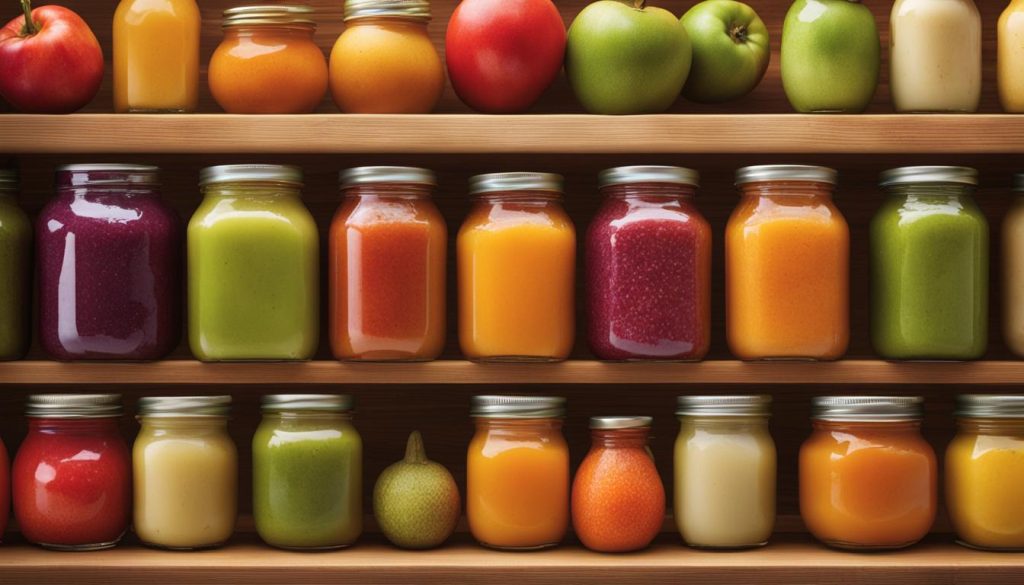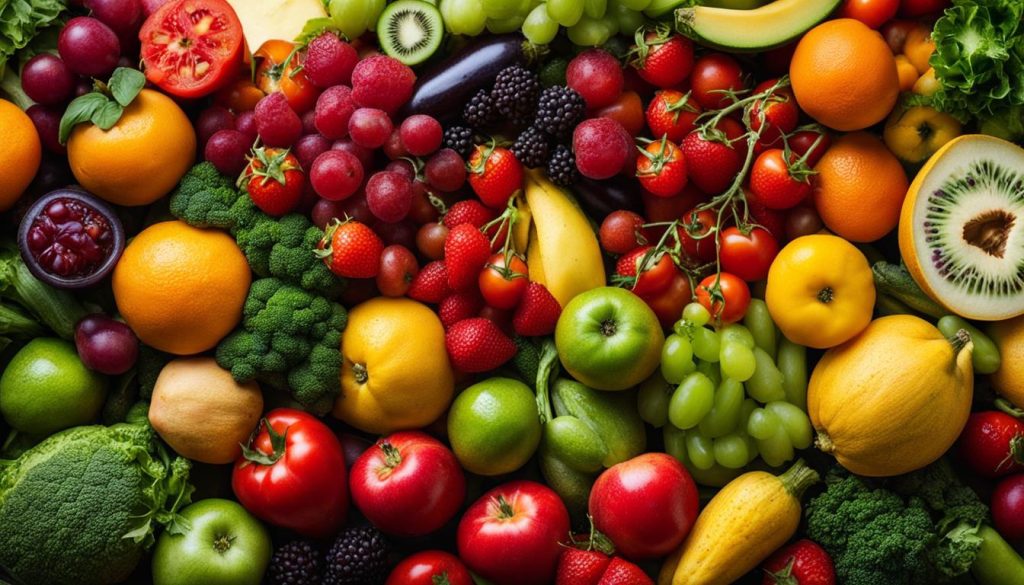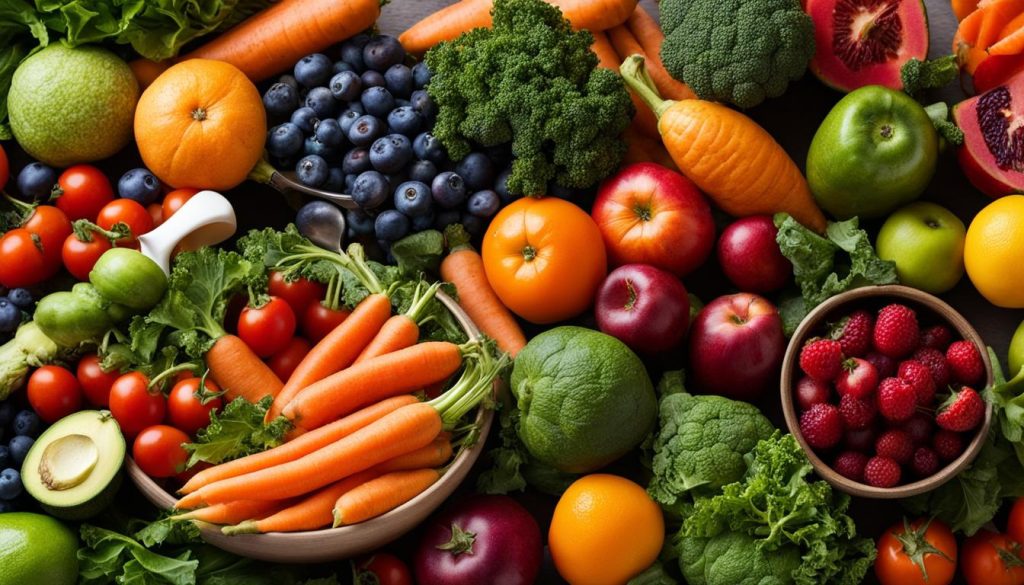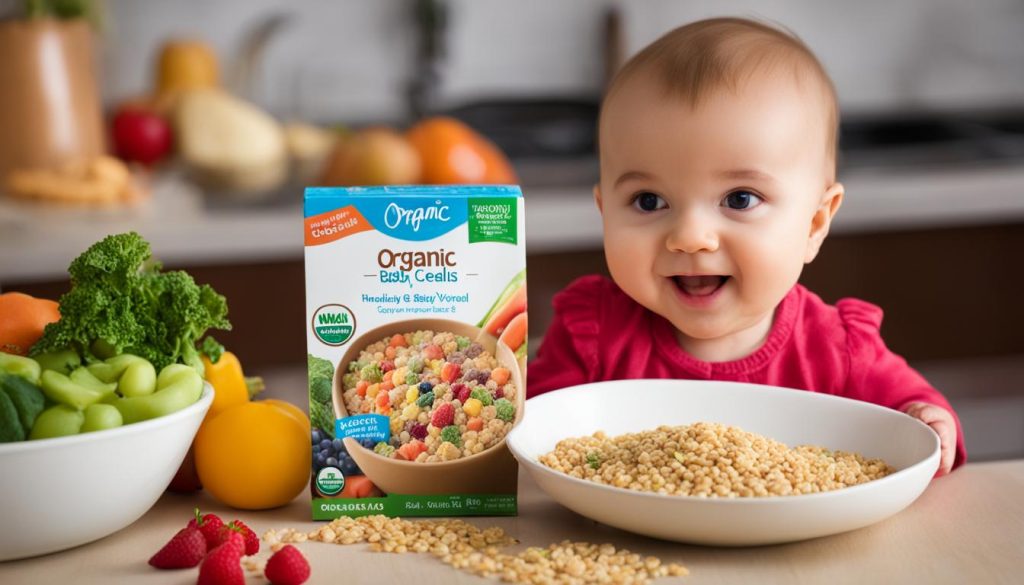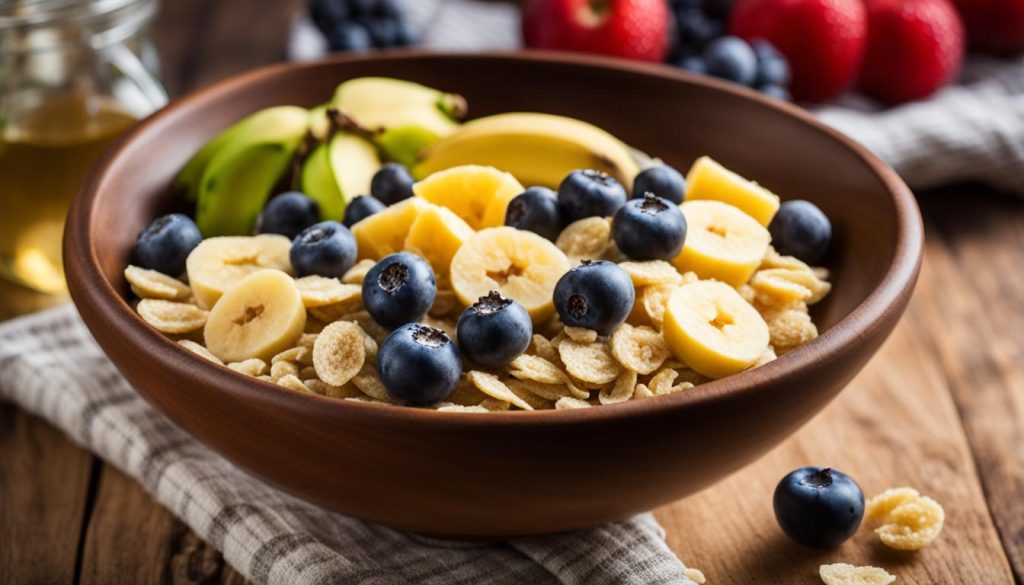The organic infant foods market is experiencing steady growth due to increasing awareness among parents about the benefits of organic food. The market is expected to grow at a CAGR during the forecast period and is driven by factors such as health-conscious parenting, rising disposable income, and the preference for chemical-free baby food. Government initiatives and online retailing also contribute to the market growth. Major players in the market include Abbott Laboratories, Danone, Nestle, HiPP, and Bellamy, who offer a variety of organic infant food products.
When it comes to feeding our little ones, we want nothing but the best. That’s why many parents are turning to organic baby food for its numerous benefits. In this article, I will explore the advantages of organic baby food, delve into the differences between organic and conventional options, and provide tips for parents who are choosing the best organic baby food brand for their little ones.
Benefits of Organic Baby Food for Young Children’s Health and Development
When it comes to feeding young children, the choice of food plays a crucial role in their growth and development. Organic baby food, made from organically grown ingredients, offers numerous benefits for the health and well-being of young children. Let’s take a closer look at some of the key advantages of organic baby food.
Firstly, organic baby food is free from synthetic pesticides, fertilizers, antibiotics, and growth hormones. This significantly reduces the risk of young children being exposed to harmful chemicals commonly found in conventional baby food. By choosing organic, parents can provide their little ones with a cleaner, more natural option that supports their overall health.
Moreover, organic baby food tends to have a higher nutritional content compared to conventional alternatives. Organic farming methods prioritize soil health and sustainable practices, resulting in produce that is often richer in vitamins, minerals, and antioxidants. This ensures that young children receive the necessary nutrients for their growth and development, giving them a strong foundation for a healthy future.
In addition, organic baby food is often perceived as safer and healthier by parents. The strict regulations and certifications associated with organic products provide peace of mind, knowing that the food they are feeding their children is free from artificial additives and preservatives. This reassurance, combined with the knowledge of the environmental benefits of organic farming, makes organic baby food an increasingly popular choice among health-conscious parents.
Table: Nutritional Comparison
| Category | Organic Baby Food | Conventional Baby Food |
|---|---|---|
| Vitamin Content | Higher levels of vitamins | Lower levels of vitamins |
| Mineral Content | Richer in minerals | Less minerals |
| Antioxidant Content | Abundant antioxidants | Limited antioxidants |
*Table for illustrative purposes only, based on general nutritional comparisons between organic and conventional baby food.
Overall, organic baby food provides a range of benefits for young children’s health and development. By offering a cleaner, more nutrient-dense option, parents can give their children the best possible start in life. With increasing awareness and demand for organic products, the future of organic baby food looks promising, as more parents prioritize the health and well-being of their little ones.
Differences Between Organic and Conventional Baby Foods
When it comes to choosing the best nutrition for your baby, understanding the differences between organic and conventional baby foods is essential. Organic baby food is made from organic ingredients that are grown without the use of synthetic pesticides or fertilizers. On the other hand, conventional baby food may contain these chemicals, which can pose potential risks to your little one’s health.
Moreover, organic baby food stands out by avoiding the use of antibiotics and growth hormones, which may be present in conventional baby food products. By opting for organic, you can ensure that your baby’s food is free from these additives that might have long-term effects on their well-being.
Not only are organic baby foods free from potentially harmful chemicals, but they also often have a higher nutritional content compared to their conventional counterparts. The natural farming methods used in organic food production result in ingredients that are richer in vitamins, minerals, and antioxidants. By feeding your baby organic food, you’re providing them with a wholesome and nutrient-dense diet from the start.
In summary, choosing organic baby food over conventional options offers numerous benefits. It eliminates the risk of exposing your baby to harmful chemicals, antibiotics, and growth hormones. Furthermore, organic baby food provides a higher nutritional content, ensuring that your child is getting the best possible start in life. By prioritizing organic options, you’re making a conscious and informed choice for your baby’s health and well-being.
Nutritional Content of Organic Baby Food
When it comes to feeding our little ones, we want to ensure that they are getting the best nutrition possible. That’s why many parents turn to organic baby food, which is known to have a higher nutritional content compared to conventional baby food. But what exactly makes organic baby food more nutritious?
Organic baby food is made from organically grown ingredients, which means they are grown without the use of synthetic pesticides, fertilizers, antibiotics, or growth hormones. This natural farming method helps to preserve the nutritional value of the ingredients, resulting in baby food that is packed with vitamins, minerals, and antioxidants. The absence of artificial additives and preservatives also ensures that young children receive the necessary nutrients for their growth and development.
Studies have shown that organic fruits and vegetables have higher levels of certain nutrients compared to their conventionally grown counterparts. For example, organic baby food has been found to contain higher levels of vitamin C, beta-carotene, and antioxidants. These nutrients play a crucial role in supporting a child’s immune system, promoting healthy growth, and reducing the risk of chronic diseases later in life.
| Nutrient | Organic Baby Food | Conventional Baby Food |
|---|---|---|
| Vitamin C | Higher levels | Lower levels |
| Beta-carotene | Higher levels | Lower levels |
| Antioxidants | Higher levels | Lower levels |
Furthermore, organic baby food is free from pesticide residues, as organic farming practices prohibit the use of synthetic pesticides. This is especially important for young children, who are more susceptible to the negative effects of pesticide exposure. By choosing organic baby food, parents can have peace of mind knowing that they are providing their little ones with food that is safe, healthy, and free from harmful chemicals.
Absence of Pesticides in Organic Baby Food
When it comes to choosing the best food for our little ones, parents are increasingly turning to organic baby food options. One of the key advantages of organic baby food is the absence of pesticides. Organic farming practices prohibit the use of synthetic pesticides, ensuring that the food is free from harmful chemicals that may pose a risk to young children’s health. This is especially important as babies and toddlers are more susceptible to the negative effects of pesticides due to their developing immune systems and smaller body sizes.
Studies have shown that conventionally grown fruits, vegetables, and grains can contain residues of synthetic pesticides, which are used to control pests and weeds. These residues can be ingested by young children when they consume conventional baby food. In contrast, organic baby food is made from ingredients that are grown using natural farming methods without the use of synthetic pesticides. This means that parents can have peace of mind knowing that they are feeding their babies food that is safe and free from pesticide residues.
Furthermore, the absence of pesticides in organic baby food not only benefits the health of young children but also the environment. By choosing organic options, parents are supporting sustainable farming practices that prioritize the use of natural methods to control pests and weeds. This helps to reduce the overall reliance on synthetic pesticides and promotes the health of ecosystems and biodiversity.
In conclusion, the absence of pesticides in organic baby food is a significant advantage for parents who prioritize the health and well-being of their little ones. Choosing organic options ensures that young children are not exposed to harmful chemicals that may be present in conventional baby food. Additionally, opting for organic baby food supports sustainable farming practices and promotes a healthier environment for future generations.
Tips for Parents Choosing Organic Baby Food
When it comes to choosing organic baby food for your little one, there are a few important tips to keep in mind. As a parent, you want to make sure you’re providing the best possible nutrition for your child while also considering their specific dietary needs. Here are some tips to help you navigate the world of organic baby food:
- Do your research: Take the time to read up on different organic baby food brands and their ingredients. Look for brands that are transparent about their sourcing and production methods.
- Check for certifications: Look for organic baby food products that have been certified by reputable organizations such as the USDA. These certifications ensure that the products meet strict standards for organic farming and production.
- Consider your baby’s dietary needs: Every baby is different, so it’s important to choose organic baby food that caters to your little one’s specific dietary needs. Whether your baby has allergies, sensitivities, or specific nutritional requirements, look for brands that offer options tailored to these needs.
- Read reviews and seek recommendations: Take advantage of online resources, such as baby food reviews and parent forums, to get insights and recommendations from other parents. Hearing about their experiences can help you make more informed decisions.
By following these tips, you can feel confident in your choice of organic baby food and provide your child with the best possible nutrition.
Expert Quote:
“Choosing organic baby food is a great way to ensure that your child is getting the highest quality nutrition while minimizing their exposure to harmful chemicals. By doing your research, checking certifications, and considering your baby’s dietary needs, you can make informed decisions and provide your baby with the best start in life.” – Dr. Sarah Thompson, Pediatric Nutritionist
Conclusion: The Future of Organic Baby Food
In conclusion, the future of organic baby food looks promising. With increasing awareness among parents about the benefits of organic food, the market for organic infant foods is projected to experience steady growth. As health-conscious parenting continues to gain momentum and disposable incomes rise, more and more parents are opting for chemical-free and natural baby food options.
Manufacturers have a unique opportunity to develop innovative organic infant food products that cater to specific dietary needs. Whether it’s gluten-free or lactose-free options, the demand for specialized organic baby food is on the rise. Parents are becoming more discerning and are actively seeking out brands that they trust, ensuring the authenticity of the products by checking ingredients lists and certifications such as USDA organic.
Furthermore, governments and regulatory bodies are taking initiatives to promote organic farming and improve infant nutrition. These efforts not only contribute to the growth of the organic infant foods market but also emphasize the importance of providing babies with safe and nutritious food options.
In conclusion, the future of organic baby food is bright. As parents continue to prioritize their baby’s health and well-being, the demand for organic baby food will only increase. With ongoing advancements in organic farming and a focus on developing innovative products, the organic infant foods market will continue to thrive, offering parents more choices and ensuring that babies receive the best start in life.
FAQ
What is organic baby food?
Organic baby food is made from organically grown ingredients and is free from synthetic pesticides, fertilizers, antibiotics, and growth hormones.
What are the benefits of organic baby food?
Organic baby food offers several benefits for young children’s health and development, including a lower risk of exposure to harmful chemicals, higher nutritional content, and better overall health.
How is organic baby food different from conventional baby food?
Organic baby food is made from organic ingredients grown without synthetic pesticides or fertilizers, while conventional baby food may contain these chemicals. Organic baby food also avoids the use of antibiotics and growth hormones, which may be present in conventional baby food.
Does organic baby food have a higher nutritional content?
Yes, organic baby food is known to have a higher nutritional content compared to conventional baby food. It is made from organically grown ingredients, which have been found to contain higher levels of vitamins, minerals, and antioxidants.
What is the advantage of organic baby food being free from pesticides?
One of the key advantages of organic baby food is the absence of pesticides. Organic farming practices prohibit the use of synthetic pesticides, ensuring that the food is free from harmful chemicals. This is important for young children’s health as they are more susceptible to the negative effects of pesticides.
How can parents choose the best organic baby food brand?
When choosing organic baby food, it is important for parents to do their research and find a brand that they trust. Reading the ingredients list and looking for certifications such as USDA organic can help ensure the product’s authenticity.
What does the future hold for organic baby food?
The organic infant foods market is expected to continue growing in the coming years, driven by increasing consumer awareness and the demand for chemical-free and natural baby food options. The market offers opportunities for manufacturers to develop innovative organic infant food products that cater to specific dietary needs.

